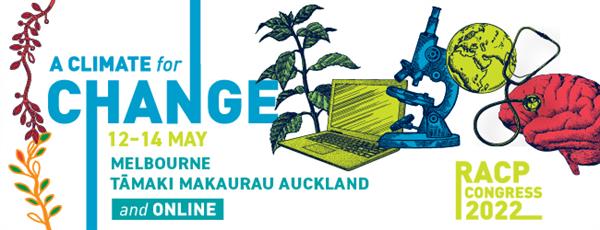The President's Message – 21 December 2021
The end of 2021 is upon us, and in many senses, a lot of us may think it’s a year we’d rather forget. There’s been the relentless march of new virus variants, the struggle of coping with lockdowns and new waves of infection as the Northern Hemisphere winter sets in.
Many of us continue to bear increased workloads and the stress of treating seriously ill patients. But as counter intuitive as it may seem, this slow burning, global healthcare crisis has also presented our College with opportunities.
As an advisor to US President Barak Obama once said, a crisis is “…an opportunity to do things you think you could not do before.”
Prior to COVID-19, we wouldn’t have thought we could rapidly pivot our trainee clinical examinations to an online model. Prior to COVID-19, we wouldn’t have thought we could quickly make widespread use of telehealth permanent. Prior to COVID-19, we wouldn’t have thought we could hold online RACP Congresses that have been as successful as in person events.
Two years ago, the idea of allowing College staff to work from home and investing the considerable savings in improved services to members would have seemed fanciful. Widespread acceptance of the use of videoconferencing allowing us to meet from anywhere might have been expected within a decade.
Launching an online community for members was something that had been discussed but hadn’t been implemented. Yet here we are in the second year of COVID-19, and we have achieved all those things, and more. Once again, we renewed our AMC and MCNZ accreditation.
Members spoke with the Australian Federal Health Minister in a series of successful virtual Town Hall meetings. The ACNC concluded it’s engagement with us – after we completed 178 recommended changes to the College – and we’re better for doing so.
And we continued to make your voices heard on issues from doctors health and wellbeing through to the health effects of climate change. We cannot ignore or minimise the devastating loss of life, serious illness and the suffering caused worldwide by COVID-19. It’s continued to cast a disruptive and deadly shadow across everyday life this year. But even during this dark, global crisis we’ve found opportunities. We’ve made positive change happen at an accelerated pace – and we’re determined to continue doing so.
I would like to thank my fellow Board Directors, our CEO Peter McIntyre and the entire College team for an extraordinary response to an extraordinary year. But most of all, thank you to you, our members for your hard work, on behalf of your College, your patients and our communities during 2021.
You’ll soon also have the chance to become directly involved in shaping the future of our College. We begin College elections next month – with the call for nominations opening on Friday, 14 January 2022.
But for now, I hope you have a safe and restful holiday season.
Professor John Wilson AM
RACP President

 Join us at RACP Congress 2022 for the Pricilla Kincaid-Smith Oration delivered by Dr Arnagretta Hunter, (picture attached) Physician and cardiologist, Dr Arnagretta Hunter is the ACT Chair of Doctors for the Environment Australia (DEA) and is also a member of the Climate and Health Alliance (CAHA). With a research interest in health consequences of climate change, her clinical work focuses on patient-centred care and preventative medicine, with an interest in social and environmental determinants of health.
Join us at RACP Congress 2022 for the Pricilla Kincaid-Smith Oration delivered by Dr Arnagretta Hunter, (picture attached) Physician and cardiologist, Dr Arnagretta Hunter is the ACT Chair of Doctors for the Environment Australia (DEA) and is also a member of the Climate and Health Alliance (CAHA). With a research interest in health consequences of climate change, her clinical work focuses on patient-centred care and preventative medicine, with an interest in social and environmental determinants of health.
Explore the program
What can you do to advance gender equity in medicine?
As part of the ongoing efforts of the RACP to achieve gender equity in medicine, RACP Congress 2022 is proud to bring you the Women in Medicine lunch. Join us as we look at what has been achieved so far and the steps that need to be taken next. Make sure to nominate your attendance when you register.
We’re pleased to announce the release of our latest RACP Member Statistics and Insights Report to you.
Using data as at 30 June 2021, the Report is presented in an easily readable, visual form that provides Fellow and trainee membership data across Australia and New Zealand, both at a high level and down to considerable detail by:
- Division, Faculty and Chapter
- physician career stage
- regional distribution in both countries
- international membership
- demographics such as age, gender distribution and members who identify as either Aboriginal or Torres Strait Islander, and Māori.
The report also identifies trends in cohort growth, emphasising the rapidly changing nature of our profession.
The Member Statistics and Insights Report is available online. We invite you to download a copy and read on to find out more. Please send any feedback to memberservices@racp.edu.au.
Most Fellows and trainees will be regularly involved in the care of patients who might die in the next 12 months. Many will also see these patients being given treatment that is not consistent with their preferences, or will not have significant benefit. The recently updated End-of-Life Care Curated Collection contains the most relevant resources to guide and educate physicians on the issues that arise at end of life so that you are able to recognise when a patient is entering this stage. The Collection is thematically structured, so you can search and filter for the resources that suit your needs.
Curated Collections are developed based on the contributions and peer review of RACP Fellows and other experts. Don’t forget to claim CPD credits for time spent on online learning resources.
The new Quality and Safety in Rural Australia self-paced online course has been designed to get you thinking about the unique factors and challenges of practising healthcare in rural Australia. It investigates, in a practical way, how quality and safety may differ in rural Australia and offers some useful information and resources to assist you to deliver the best care in these settings.
Developed by experts and RACP Fellows, this adaptable course features a mix of in-depth content, video scenarios, reflection and discussion activities and recommended supporting materials.

Applications close Monday, 31 January 2022 5pm AEDT
Medical students, junior medical officers and RACP trainees, who identify as an Aboriginal person, Torres Strait Islander or Māori, are provided educational and networking opportunities through the RACP President’s Indigenous Congress Prize.
The Prize provides exposure to career pathways and supports an understanding of the health needs of Aboriginal, Torres Strait Islander and Māori peoples. Recipients also gain insight into the work RACP conducts to help ‘Close the Gap’ — achieving equitable access to health and better outcomes for Indigenous peoples.
Eligibility
- identify as Aboriginal, Torres Strait Islander or Māori
- be studying, researching or working in a field of medicine, medical science or medical education at an undergraduate, postgraduate or trainee level.
Prize
The successful recipient receives full trainee/medical student registration, return economy domestic or trans-Tasman airfares and up to three nights' accommodation to attend RACP Congress 2022.
Ep76: Making amends: Medical injury part three
This is the third podcast in a series about medical injury. First we talked about what victims of injury want to hear from the health system after such an event. And then we discussed the guilt and compromised professional identity that doctors might feel when they’ve been involved in a patient harm. We also heard how fear of medicolegal suits is a major obstacle to greater transparency. At least that’s the case in Australia, where litigation is virtually the only way for victims to get financial compensation for their hardship and ongoing care. Aotearoa New Zealand, by contrast, operates a no-fault compensation scheme where all such costs are born by the government, for harms from care that are relatively unpredictable. We’ll look at the advantages this system has, for patients and practitioners, but also at some of the issues that remain unresolved.
Subscribe to email alerts or search for ‘Pomegranate Health’ in Apple Podcasts, Spotify, Castbox or any podcasting app. Fellows of the RACP can claim CPD credits for listening and learning via MyCPD.
The December 2021 issue of the Internal Medicine Journal is now live on the RACP website (login using RACP login credentials). You can now access full journal issues as PDFs using the link to the digital editions on this page. This month’s Editor's Choice is titled 'Integrated electronic health record facilitates a safer and more efficient rural outreach haematology service'.
Other highlights from the issue are:
- Spirituality curricula in medical education
- Insomnia disorders
- Industry payments to oncologists and haematologists
- Knowledge of research ethics guidelines in public health clinicians
- Diabetic retinopathy in Indigenous Australians
- Oromandibular parafunction in chronic graft disease versus host disease
Read now
The November edition of the Journal of Paediatrics and Child Health – 'Effects of climate change on children' is now live on the Wiley Online Library website.
Read now
Stay informed
Read other RACP eBulletins: